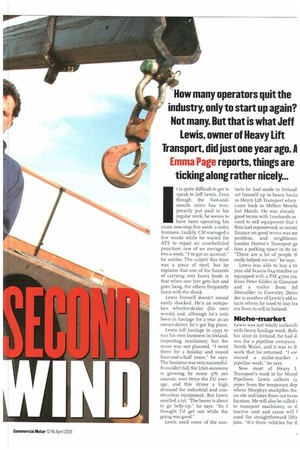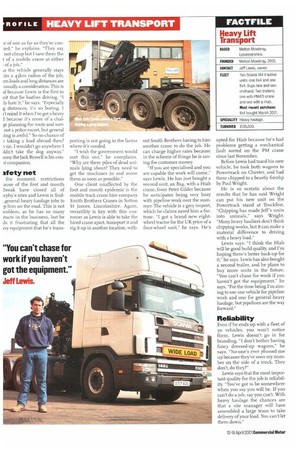How many operators quit the industry, only to start up again?
Page 43

Page 44

If you've noticed an error in this article please click here to report it so we can fix it.
Not many. But that is what Jeff Lewis, owner of Heavy Lift Transport, did just one year ago. A Emma Page reports, things are ticking along rather nicely...
t is quite difficult to get to speak to Jeff Lewis. Even though the foot-andmouth crisis has temporarily put paid to his regular work, he seems to have been operating his crane non-stop this week: a noisy business. Luckily, CM managed a few words while he waited for ATS to repair an unscheduled puncture: one of an average of two a week. "I've got an account," he smiles. The culprit this time was a piece of steel, but he explains that one of the hazards of carrying very heavy loads is that when one tyre gets hot and goes bang, the others frequently burst with the shock.
Lewis himself doesn't sound easily shocked. He's an outspoken wheeler-dealer (his own words) and, although he's only been in haulage for a year as an owner-driver, he's got big plans.
Lewis left haulage in 1995 to run his own business in Ireland, importing machinery, but the move was not planned. "I went there for a holiday and stayed four-and-a-half years," he says. The business was very successful. It couldn't fail: the Irish economy is growing by some 9% per annum, over twice the EU average, and this drives a high demand for industrial and construction equipment. But Lewis smelled a rat. "The boom is about to go belly-up," he says. "So I thought I'd get out while the going was good."
Lewis used some of the con
tacts he had made in Ireland set himself up in heavy haula as Heavy Lift Transport when came back to Melton Mowb3 last March. He was already good terms with Lombards as used to sell equipment that t firm had repossessed, so securi finance on good terms was no problem, and neighbouri haulier Hortor's Transport ga him a parking space in its ya: "There are a lot of people really helped me out," he says.
Lewis was able to buy a ti; year old Scania 6x4-tractive Ul equipped with a PM 47tm cra from Peter Gilder in Gloucesi and a trailer from Jo] Demulder in Coventry. Demi der is another of Lewis's old cc tacts whom he used to buy tra ers from to sell in Ireland.
Niche-market
Lewis was not totally unfamili with heavy haulage work. Befo his stint in Ireland, he had d ven for a pipeline company North Wales, and it was to tl: work that he returned. "I en: sioned a niche-market ( pipeline work," he says.
Now most of Heavy L Transport's work is for Murpl Pipelines. Lewis collects 13 pipes from the temporary dep where Murphys stockpiles the on site and takes them out to eal location. He will also be called to transport machinery, or t1 tractive unit and crane will 1 used for straightforward lifti/ jobs. "It's three vehicles for ti :e of one as far as they're conaed," he explains. They say not cheap but I save them the t of a mobile crane at either of a job."
Ls the vehicle generally stays am n a 45km radius of the job, in' loads and long distances are usually a consideration. This is because Lewis is the first to nit that he loathes driving. "I dy hate it," he says. "Especially g distances; it's so boring. I it mind it when I've got a heavy because it's more of a chalge planning the route and sortout a police escort, but general .ring is awful." So no chance of talcing a load abroad then? no. I wouldn't go anywhere I ildn't take the dog anyway." nmy the jack Russell is his conit companion.
ifety net
the moment, restrictions :ause of the foot and mouth break have closed all of irphy's sites and Lewis is find, general heavy haulage jobs to him on the road. This is not 'roblem, as he has so many itacts in the business, but he ds it frustrating that all the ivy equipment that he's trans
porting is not going to the farms where it's needed.
"I Wish the government would sort this out," he complains. "Why are there piles of dead animals lying about? They need to get the machines in and move them as soon as possible."
One client unaffected by the foot and mouth epidemic' is the mobile track crane hire company Smith Brothers Cranes in Sutton St James, Lincolnshire. Again, versatility is key with this customer as Lewis is able to take the hired crane apart, transport it and rig it up in another location, with
out Smith Brothers having to hire another crane to do the job. He can charge higher rates because in the scheme of things he is saving the customer money.
"If you are specialised and you are capable the work will come," says Lewis. He has just bought a second unit, an 8x4, with a Hiab crane, from Peter Gilder because he anticipates being very busy with pipeline work over the summer. The vehicle is a grey import, which he claims saved him a fortune. "I got a brand new eightwheel tractor for the UK price of a four-wheel unit," he says. He's opted for Hiab because he's had problems getting a mechanical fault sorted on the PM crane since last November.
Before Lewis had taxed his new vehicle, he took both wagons to Powertrack on Chester, and had them chipped to a beastly Goohp by Paul Wright.
He is so ecstatic about the results that he has said Wright can put his new unit on the Powertrack stand at Truckfest. "Chipping has made Jeff's units into animals," says Wright. "Many heavy hauliers don't think chipping works, but it can make a material difference to driving with a heavy load."
Lewis says: "I think the Hiab will be good build quality, and I'm hoping there's better back-up for it," he says. Lewis has also bought a second trailer, and he plans to buy more units in the future. "You can't chase for work if you haven't got the equipment," he says. "For the time being I'm aiming to use one vehicle for pipeline work and one for general heavy haulage, but pipelines are the way forward."
Reliability
Even if he ends up with a fleet of 30 vehicles, you won't notice them. Lewis doesn't go in for branding. "I don't bother having fancy dressed-up wagons," he says. "No-one's ever phoned me up because they've seen my number on the side of a truck. They don't, do they?"
Lewis says that the most important quality for the job is reliability. "You've got to be somewhere when you say you will be. If you can't do a job, say you can't. With heavy haulage the chances are that a site manager will have assembled a large team to take delivery of your load. You can't let them down."
































































































